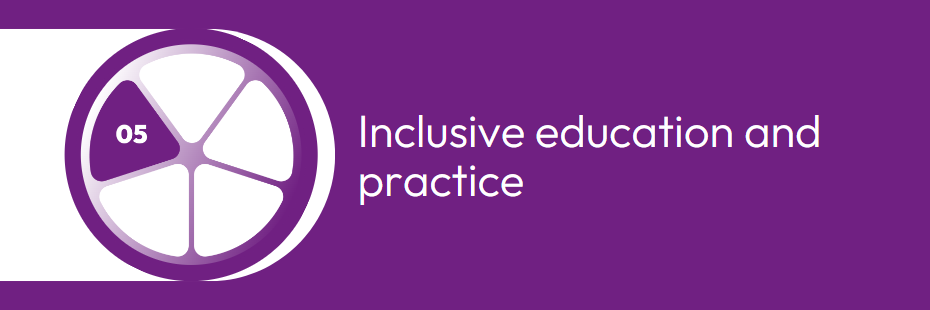Inclusive education and practice
To foster an inclusive education and practice, we will contextualise our Transformative Education Framework by sharing Race Equality Charter data dashboards with the Education Strategy Group. We will strive to determine what "inclusive awarding" looks like for our context and improve our data in this area at a granular level. Additionally, we will facilitate opportunities to share emerging practice around inclusive education through the lens of anti-racism. We will evaluate the impact of ongoing decolonization work and continue to address concerns raised by students regarding ethnicity and race in academic discussions. For a comprehensive list of our goals, please see below.
| Aim 36 |
|---|
| Aim (What) |
|
We will further contextualise our Transformative Education Framework (as described in section 8 of our Race Equality Charter application) by sharing future Race Equality Charter data dashboards with the Education Strategy Group to create synergy between the Transformative Education Framework and Race Equality Charter. |
|
Rationale/ Issues Identified (Why) |
|
As our Transformative Education Framework evolves, it will be critical to share future Race Equality Charter data dashboards. Our Race Equality Charter findings have already been shared in the development phases of the Transformative Education Framework and have helped shape it, our focus for next steps is to build on this. Race Equality Charter survey: Around half of Black, Asian and Minority Ethnic students agreed that issues of ethnicity and race are included in academic discussions. |
|
Action(s) to address the issue (How) |
|
|
Measure |
|
Race Equality Charter framework and data requirements embeded into Transformative Education Framework, creating an alignment between Race Equality Charter findings and future requirements with the Transformative Education Framework. |
| Aim 37 |
|---|
| Aim (What) |
|
We will determine what "inclusive awarding" looks like for our context and improve our data in this area at granular level. |
|
Rationale/ Issues Identified (Why) |
|
At present we consider awarding/attainment through the lens of one characteristic, however, we aspire to be more accurate in the future by reviewing data intersectionally. To understand our attainment/ awarding data, we need to understand this at a more granular level. |
|
Action(s) to address the issue (How) |
|
|
Measure |
|
|
Aim 38 |
|---|
| Aim (What) |
|
We will facilitate opportunities to share emerging practice around inclusive education through the lens of anti-racism. |
|
Rationale/ Issues Identified (Why) |
|
Gap analysis (pages 180-183) shows that there is much variation across our Faculties (and within the different disciplines within the Faculty as well) in the way in which they include race equality within course content. |
|
Action(s) to address the issue (How) |
|
|
Measure |
|
Good practice is sourced and shared leading to an improvement in student feedback in our 2025 Race Equality Charter survey. |
| Aim 39 |
|---|
| Aim (What) |
|
We will evaluate the impact of the ongoing decolonisation work. |
|
Rationale/ Issues Identified (Why) |
|
We have commenced our decolonising journey and see this as ongoing work that we will continue to engage with and address through curriculum, programme reviews, awarding gaps data and through recognition and redress of structures of inequality. |
|
Action(s) to address the issue (How) |
|
|
Measure |
|
Feedback data received to be incorporated into further developing our University Decolonising Toolkit. |
| Aim 40 |
|---|
| Aim (What) |
|
We will continue to address concerns raised by students regarding ethnicity and race in academic discussions. |
|
Rationale/ Issues Identified (Why) |
|
Race Equality Charter survey: Around half of Black, Asian and Minority Ethnic students agreed that issues of ethnicity and race are included in academic discussions. Some students noted challenges when discussing issues related to race and ethnicity due to being in predominately non-Black, Asian and Minority Ethnic settings. This varied by subject area,and some good examples provided included film studies integrating race and ethnicity discussions. |
|
Action(s) to address the issue (How) |
|
|
Measure |
|
Review impact of actions through pulse checkers and feedback through Race Equality Charter survey 2025. |

